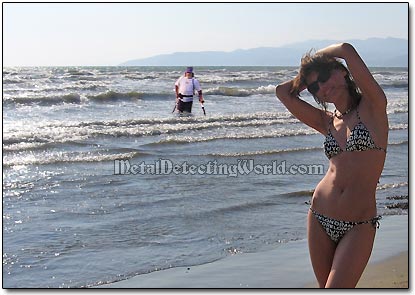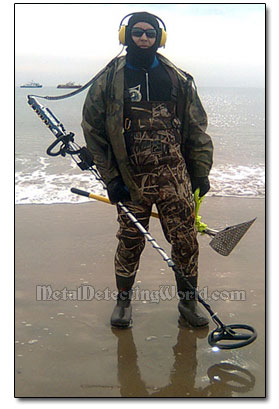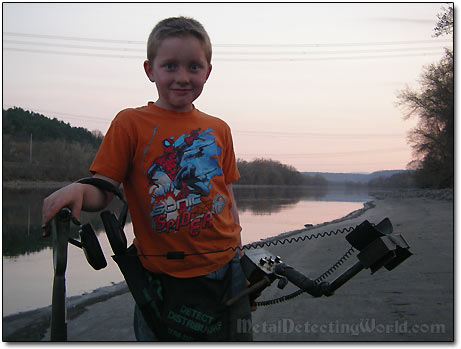Types of Metal Detecting Activities, page 21:
WET SAND BEACH HUNTING
(CONTINUED from previous page)
Shallow Surf Hunting - Wading with Metal Detector in Shallow Waters
Shallow water metal detecting is considered the most productive type of beach hunting.

Shallow surf for wading with a metal detector means less than four feet deep. It could be either an area flooded during the high tide taking over or the area with deeper water situated either in the lower foreshore zone or the upper shoreface area outside the intertidal zone.
Wading with a Metal Detector in Shallow Surf during Low Tide

Both areas are impossible to completely clean of the targets since metal detecting in the water is much harder than on wet sand. Inability to see through the water where the search coil is moving, constant movements of water, difficulties in target recovery are just a few major reasons for valuable targets always being left behind and available for the next detectorist.
Plus, periodic tides and storms redeposit valuables in shallow waters; thus, making coins and jewelry readily available for the first beach hunter to come. And finally, the stronger winter tides replenish the shallow surf areas with coins and jewelry during the annual beach erosion and beach rebuilding cycles. These natural processes provide endless opportunities for any shallow surf hunter.
Ready to Go into Deep Surf

Freshwater Wet Beach Hunting
Freshwater wet beach hunting refers to metal detecting on wet beaches of the freshwater lakes and rivers, and on riverbeds during the low tides. This type of beach hunting results in recovering oldest silver and copper coins, old jewelry and relics because historically the rivers and water bodies were the earliest means of transportation and commerce. The most productive spots include old ferry landings, beaches, popular swimming holes, merchant boat landings, places of historical battles, coastal shipwrecks, etc.
Unless you detect in close proximity to the river mouth where freshwater is mixed with oceanic or sea saltwater, you might not worry about the effects of salt mineralization on your land detector's performance. But in every case, of course, one has to experiment and see whether the high tides bring too much saltwater up the river or not. On rivers without tidal activity, you can use the same program settings on your land metal detector that you normally use at the land hunt sites.
If you plan to metal detect on the river which has strong tides, make sure you know the timetables of high tides and organize your river detecting outings accordingly. Otherwise your metal detecting time will be reduced to a very short while. The river tides usually come extremely fast, so make sure you are not too far away from the riverbank when the tide is coming, and you will need to evacuate safely and without sinking your detector in water, or losing your footwear in mud.
Not to get stuck in the mud, try to walk where there are a few rocks, bottles and logs on the surface. These objects lying on surface is a good sign that the mud is fairly solid.
Freshwater Wet Beach Hunting on Mohawk River in New York State

CONTINUED ON NEXT PAGE...